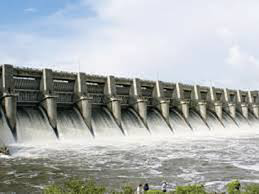
As news of the discharge of excess water from Lagdo Dam by Cameroonian authorities reached Benue State, the populace became tense.
Adamawa, Taraba, Benue, Nasarawa, Kogi, Anambra, Edo, Delta, and Bayelsa are among the states where flooding is expected, according to the National Emergency Management Agency (NEMA), which was cited yesterday by Bridget Ikyado, the Governor’s Principal Special Assistant (Media and Publicity/Strategic Communications).
According to the statement, the nine states with communities along the banks of the River Benue could be affected by the excess water from Lagdo Dam until the end of October.
Ikyado remarked that NEMA Director-General Mustapha Ahmed had also urged states and local councils along the River Niger and Benue basins to activate their emergency response plans promptly in order to prevent catastrophic damage.
James Iorpuu, Executive Secretary of the Benue State Emergency Management Agency (BSEMA), told The Guardian that the state government was still plotting out modalities and would communicate with the public today.
He reassured, however, that the government was not resting on its laurels and that plans were in the works to mitigate the impact of the impending inundation.
In anticipation of flooding in nine states, ActionAid Nigeria (AAN) has requested that the State Emergency Management Agency (SEMA) and the National Orientation Agency (NOA) use the Ecological Fund to ensure prompt coordination and raise public awareness.
The Country Director of AAN, Andrew Mamedu, stated that the group “demands an immediate and comprehensive review” of the Ecological Fund’s utilization due to the flagrant neglect of erosion and other disaster-prone zones in numerous states despite significant Ecological Fund allocations.
It also demanded the immediate deployment of the fund for emergency response and disaster prevention.
The National Emergency Management Agency (NEMA) had issued a warning about impending flooding in nine states, including Adamawa, Taraba, Benue, Nasarawa, Kogi, Anambra, Edo, Delta, and Bayelsa, which resulted in the displacement of communities and posed a significant risk of further crop and infrastructure damage.
According to AAN, the loss of 28 lives and displacement of thousands underscores the urgent need for collective and concerted efforts to resolve the crisis.
It reaffirmed its commitment to collaborating with the government, affected communities, and relevant agencies to provide immediate relief, support, and rehabilitation efforts, and urged the affected states to activate their emergency response plans immediately in order to protect lives and property.
The statement reads: “At this critical juncture, AAN calls on both the federal and state governments to collaborate with national and state emergency management agencies to provide essential relief materials and ensure that affected individuals and families receive timely support.”